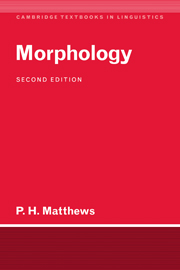Book contents
- Frontmatter
- Contents
- Preface to the first edition
- Preface to the second edition
- Principal references
- 1 What is morphology?
- 2 Word, word-form and lexeme
- 3 Inflections and word-formation
- 4 Lexical derivation
- 5 Compounds
- 6 Morphemes and allomorphs
- 7 Morphological processes
- 8 Morphophonemics
- 9 Properties and their exponents
- 10 Paradigms
- 11 Inflectional morphology and syntax
- 12 Iconicity
- Index
- Frontmatter
- Contents
- Preface to the first edition
- Preface to the second edition
- Principal references
- 1 What is morphology?
- 2 Word, word-form and lexeme
- 3 Inflections and word-formation
- 4 Lexical derivation
- 5 Compounds
- 6 Morphemes and allomorphs
- 7 Morphological processes
- 8 Morphophonemics
- 9 Properties and their exponents
- 10 Paradigms
- 11 Inflectional morphology and syntax
- 12 Iconicity
- Index
Summary
Structuralist and ancient methods: should words be segmented or related as wholes? Why the question is worth raising: success of paradigms in language teaching; children's learning; argument from ancient grammars.
An ancient model. Basic units: letters, syllables, words, sentences. Parts of speech; accidents; accidents of the Verb (Latin floret). Leading forms and inflections; grammars as descriptions of inflection. Exemplary paradigms; as technique of analogy. Rules for inflection: as morphological transformations; semantic and derivational structure. Meaning and derivation not necessarily parallel; Theodosius on týpɔː in Greek; motives for his treatment.
A modern adaptation. Relations between inflections: paradigms of Nouns in Latin. The method of transformations: Present Indicative and Subjunctive in Spanish; as relation between stems. Past and Future Participles in Latin: rules and metarules. Metarules for syncretism: Nominative and Accusative of Neuters. Comparison with ancient model; the crucial differences remain.
In the last three chapters we have seen how word-forms can be built up from their roots. Take, for example, Ancient Greek sophɔːn (σοϕῶν). This is the Genitive Plural (all Genders) of the Adjective sophos ‘clever’, and can be built up as follows. First, the lexeme (sophos) has a root soph′-, the acute accent indicating, as before, that a basic high tone follows. To this is added a Gender suffix: for example, Feminine Plural -a-. Accordingly, soph′- → soph + á, with the floating accent now assigned to a vowel. By another rule, the form must take the Genitive Plural suffix (-ɔːn): soph + á → soph + á + ɔːn.
Information
- Type
- Chapter
- Information
- Morphology , pp. 185 - 205Publisher: Cambridge University PressPrint publication year: 1991
